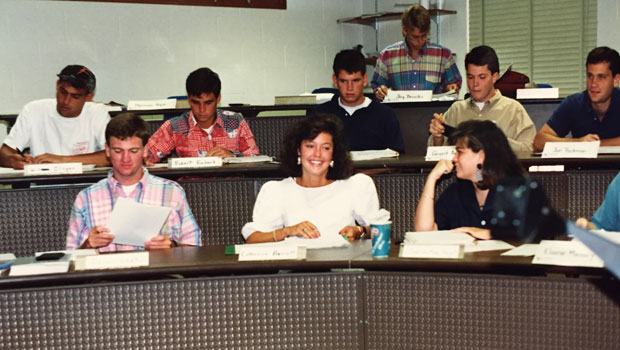
When the Summer Management Program (SMP) began in the summer of 1990, Wake Forest rising juniors and seniors wore big hair, big shoulder pads and big prints to class.
Something else big was going on – students who majored in the liberal arts started signing up for what was essentially the first business boot camp. “It was designed for students who did not want to major in business or accountancy,” said Ben King, director of the program and professor of practice at the School of Business. “It was as close as you could get to a business minor at Wake Forest back then. More importantly, we were the first University in the nation to provide this kind of condensed business education to liberal arts students.”
Fast forward 25 years, and the program has grown exponentially, from one section of about 20 students in that first class to two sections less than five years later, to the current three sections of about 110 students.
While students today are wearing different styles, what hasn’t changed is how integrative the program is run, with classes building on each other in an intensive five weeks. King says the classes build upon each other, so that what students learn in accounting also helps them as they study ratios in finance.
“We’re teaching them the language of business,” King said. “We offer not only business theory but also practical applications for what they’re learning. We give them confidence in the language of business and a proficiency in basic business principles.”
The program not only teaches accounting, marketing, strategy and finance, but also business life skills, like communicating in business, managing up, and teamwork. Every day after class, students have two to three hours of team meetings to explore projects and other assignments.
“Collaborative learning and collaborative outcomes are new to most of our students, mainly because much of their education is about individual achievement,” King said. “It helps them gain an appreciation for a diversity of perspectives from different students. They need to understand what the marketplace looks like and how richer outcomes happen when you get more than one mind involved in the process.”
Over the years, the program has brought in guest speakers who live in the intersection of liberal arts and business. Two examples include L.A. Clippers point guard – and former Demon Deacon basketball star — Chris Paul, to talk about the intersection of business and athletics and “Father of the Bride” and “Buffy the Vampire Slayer” film producer Howard Rosenman, who offered his point of view about how business and entertainment connect.
“The Summer Management Program was a great way for me to gain access to the business side of Wake Forest, and I’ve found that who I met and what I learned there has helped me to make my dreams a reality after graduation,” said Mo Earley (’13), who credits the program for changing her career trajectory. A sociology major, Earley attended the program the summer before her senior year. During the program, Wake Forest alumni from Deloitte came to give a presentation on consulting, and their passion for their jobs in federal consulting awakened something in her.
“Deloitte Day revealed that consulting wasn’t an empty business term, but rather a way to use business knowledge to apply my liberal arts perspective. It became a very attractive option for making a positive impact on the world, and has continued to provide opportunities to live out Pro Humanitate,” Earley explained. So she applied, interviewed and received a job offer that November, before graduation. Now a human capital analyst at Deloitte in Washington, D.C., Earley recommends the program to other students, whole-heartedly.
“It’s one of our shining programs at Wake Forest,” King said. “We accomplish a lot in five weeks, and we touch a lot of lives in a very impactful way.”
Categories: School of Business, Student, Top Stories, Wake Forest College
Headlines
Wake Forest in the News
Wake Forest regularly appears in media outlets around the world.




